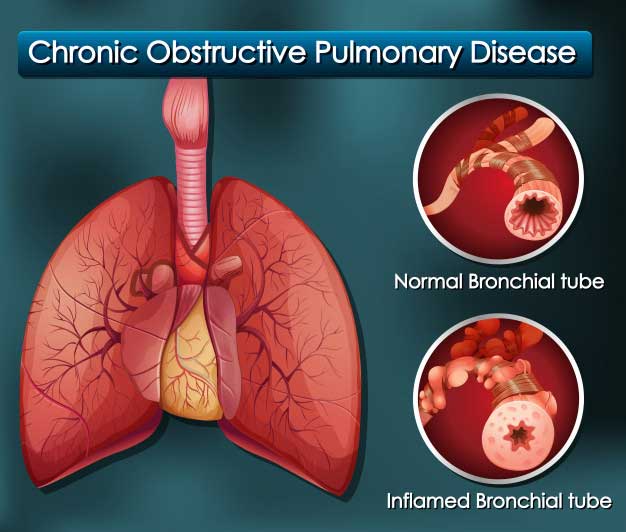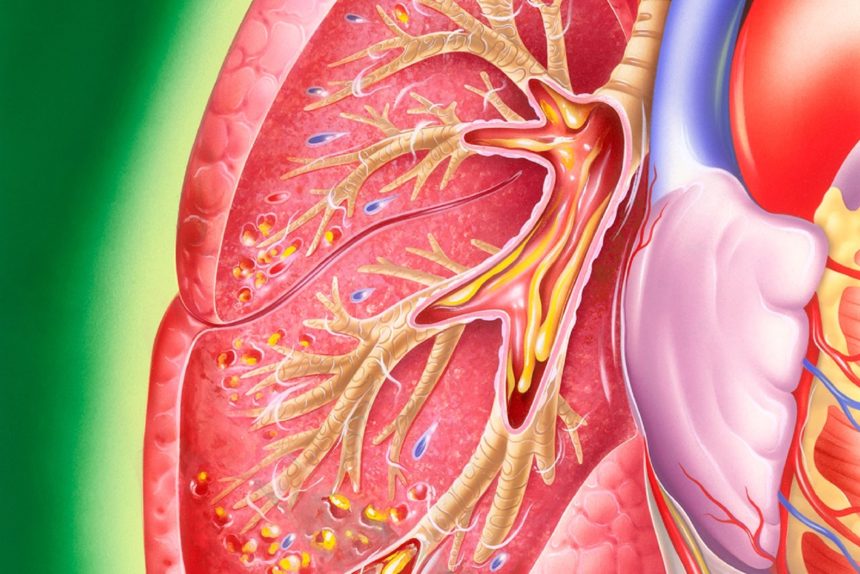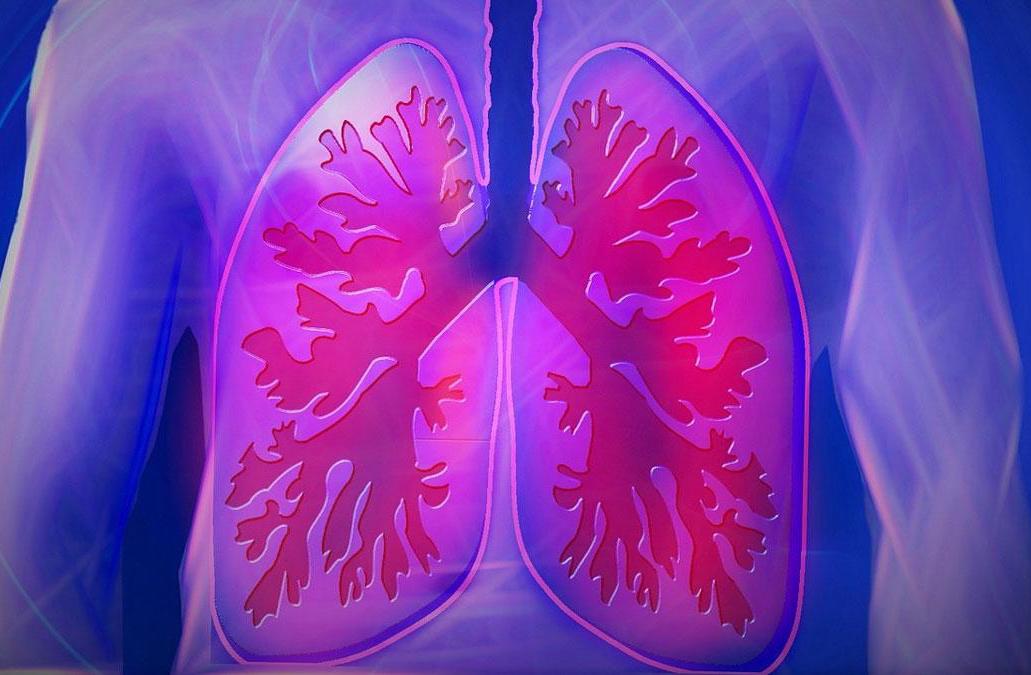Chronic obstructive pulmonary disease, otherwise known as COPD, is a debilitating chronic condition that can greatly affect you or your loved ones. Diseases that are chronic last for more than one year and require continued medical treatment.
At this moment, there is no cure for COPD, but there are many things that can be done to treat and prevent symptoms. If you or a loved one are experiencing signs of COPD, make an appointment with a medical professional as soon as you can. When left untreated, COPD can cause debilitating symptoms and could lead to death.

WHAT IS COPD?
Chronic obstructive pulmonary disease is a disease that affects your airways and hinders your ability to breathe. Those with COPD commonly have chronic bronchitis and emphysema.
Chronic bronchitis inflames the bronchial tubes that are responsible for carrying air to your lungs, which can lead to a build-up of mucus that further blocks your airways. Emphysema occurs when the air sacs located in the smallest air passages of the lung are damaged and destroyed over time, reducing the amount of air that flows out of your lungs.
When you breathe, the air flows down your trachea and into your lungs. Once it reaches the lungs, it flows into two passages that split into several more passages. These passages continue to split, almost looking like roots, and all lead to various parts of your lungs. At the end of these passages are tiny air sacs called alveoli.
Chronic Obstructive Pulmonary Disease
These sacs have very thin walls full of blood vessels. Oxygen from the air that you breathe passes through the blood vessels to enter your bloodstream. While that is happening, carbon dioxide is exhaled and released from the lungs.
The airways and air sacs are very elastic to help push the air along its path. When diseases like chronic bronchitis and emphysema lead to COPD, this can cause them to lose their elasticity. Without the natural push, air can become trapped in the lung, preventing reducing the amount of oxygen that reaches your bloodstream and increasing the amount of carbon dioxide within the lungs.
The loss of oxygen and increase of carbon dioxide can begin to destroy the thin walls of blood vessels that carry oxygen throughout your body. With less oxygen, it becomes harder to push out the carbon dioxide which can then damage the lungs. COPD is a condition that becomes worse over time. It is the third leading cause of death by disease in the United States.
WHAT ARE THE SYMPTOMS OF COPD?
- A mild cough that recurs often.
- The need to clear your throat often.
- Issues catching your breath after exercising.
As your lungs become more damaged, you may begin to experience –
- Frequent coughing and wheezing.
- Trouble catching your breath during physical activities.
- An increased amount of respiratory infections.
- Lack of energy.
- Production of mucus that can be coughed up.
Symptoms that occur in the later stages of COPD include –
- Unexpected weight loss.
- Swelling of the ankles, feet, or legs.

WHAT CAUSES COPD?
In developed countries, the main cause of COPD is tobacco smoking. In underdeveloped countries, COPD is caused by inhalation of toxic fumes from fuel that is burned to cook as well as poorly ventilated homes.
Those over the age of 40 with a history of smoking or asthma have a higher risk of developing COPD.
Occasionally, COPD can be caused by a genetic disease that causes the body to have a deficiency of a protein made in the liver called alpha-1-antitrypsin. A deficiency of this protein can lead to lung and liver damage.
CAN COPD BE PREVENTED?
Yes. Seventy-five percent of those with COPD smoke or used to smoke. Inhaling toxic fumes can damage your lung tissue, which can lead to COPD in the long run. The best way to prevent COPD is to either quit smoking or never smoke, to begin with. If you are currently a smoker, you can talk to your doctor about programs that can help you quit.
Chemical fumes and dust from your environment or workplace can also irritate and damage your lungs. Try to avoid this and secondhand smoke as much as possible.

HOW IS COPD TREATED?
Though COPD can’t be cured, there are treatments available that can ease symptoms and slow the disease’s progression.
Lifestyle changes are important and can greatly slow the progression of the disease. If you smoke, quitting will be essential to your treatment. Eating a balanced diet can also give your body the nutrients it needs to fight off the disease. It is also smart to ask your doctor how much exercise you can do without hurting yourself.
Besides lifestyle changes, other treatments include oxygen therapy, medications, vaccines, pulmonary rehabilitation, and surgery.
- Oxygen therapy is simply a treatment in which oxygen is delivered through a mask or nasal prongs to help you breathe better.
- Medications like bronchodilators can help relax the muscles around your airways, allowing them to open up.
- Vaccines like influenza and pneumonia reduce the risk of you contracting the two diseases that can cause serious complications with your breathing.
- Pulmonary rehabilitation is a series of programs that focus on the well-being of those living with chronic lung conditions. Activities might include meal planning, physical therapy, and counseling.
- Surgery is commonly a treatment for those who have the most severe symptoms. Common surgeries include bullectomies, lung volume reduction surgeries, and lung transplants.
CONCLUSION
COPD is a serious chronic lung condition that can greatly affect your life and could lead to an untimely death. If you are a smoker or are commonly exposed to second-hand smoke, you might be at a higher risk of developing COPD. Though it cannot be cured, COPD can be treated through various methods like medications and lifestyle changes.
The best way to prevent COPD is to avoid smoking or quit smoking. If you or a loved one are experiencing any of these symptoms, make an appointment with a specialist to get a correct diagnosis and treatment plan. COPD is a dangerous disease, and catching it early can be essential to living a long and healthy life coping with it.
If you or anyone you know is suffering from COPD, our expert providers at Specialty Care Clinics will take care of your health and help you recover.
Call 469-545-9983 to book an telehealth appointment for an at home check-up.
